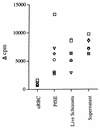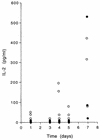Gammadelta+ T cells preferentially respond to live rather than killed malaria parasites
- PMID: 9573139
- PMCID: PMC108213
- DOI: 10.1128/IAI.66.5.2393-2398.1998
Gammadelta+ T cells preferentially respond to live rather than killed malaria parasites
Abstract
We have compared the in vitro responses of peripheral blood T cells from malaria-unexposed donors to live Plasmodium falciparum schizonts, freeze-thawed schizont extracts (P. falciparum schizont extracts [PfSE]), and parasite culture supernatants. We show that the cells responding to PfSE and parasite culture supernatants are predominantly CD4+ TCR alphabeta+ while in the presence of live schizonts there is an additional activation of TCR gammadelta+ cells. Activation of TCR gammadelta+ cells in response to PfSE was seen only when irradiated autologous feeder cells or recombinant interleukin-2 (IL-2) was added to the cultures. Live schizonts but not PfSE induced significant IL-2 production in vitro in the first 5 days after stimulation, suggesting that induction of early IL-2 by live parasites may contribute to the marked activation of the TCR gammadelta+ population.
Figures



Similar articles
-
Human TcR gamma delta+ lymphocyte response on primary exposure to Plasmodium falciparum.Clin Exp Immunol. 1994 Jan;95(1):91-7. doi: 10.1111/j.1365-2249.1994.tb06020.x. Clin Exp Immunol. 1994. PMID: 8287613 Free PMC article.
-
Activation of gammadelta T cells in malaria: interaction of cytokines and a schizont-associated Plasmodium falciparum antigen.J Infect Dis. 1997 Jul;176(1):233-41. doi: 10.1086/514029. J Infect Dis. 1997. PMID: 9207372
-
Naive human alpha beta T cells respond to membrane-associated components of malaria-infected erythrocytes by proliferation and production of interferon-gamma.Immunology. 1996 Jul;88(3):412-20. doi: 10.1046/j.1365-2567.1996.d01-661.x. Immunology. 1996. PMID: 8774359 Free PMC article.
-
Human Vδ1+ T Cells in the Immune Response to Plasmodium falciparum Infection.Front Immunol. 2019 Feb 14;10:259. doi: 10.3389/fimmu.2019.00259. eCollection 2019. Front Immunol. 2019. PMID: 30837999 Free PMC article. Review.
-
T-cell control of immunity to the asexual blood stages of the malaria parasite.Crit Rev Immunol. 1994;14(2):131-55. doi: 10.1615/critrevimmunol.v14.i2.20. Crit Rev Immunol. 1994. PMID: 7702748 Review.
Cited by
-
Cellular basis of early cytokine response to Plasmodium falciparum.Infect Immun. 2001 Apr;69(4):2364-71. doi: 10.1128/IAI.69.4.2364-2371.2001. Infect Immun. 2001. PMID: 11254594 Free PMC article.
-
Metabolic routes as targets for immunological discrimination of host and parasite.Infect Immun. 2000 Aug;68(8):4375-7. doi: 10.1128/IAI.68.8.4375-4377.2000. Infect Immun. 2000. PMID: 10899832 Free PMC article. Review. No abstract available.
-
Strain variation in early innate cytokine induction by Plasmodium falciparum.Parasite Immunol. 2010 Jul;32(7):512-27. doi: 10.1111/j.1365-3024.2010.01225.x. Parasite Immunol. 2010. PMID: 20591122 Free PMC article.
-
The war between the malaria parasite and the immune system: immunity, immunoregulation and immunopathology.Clin Exp Immunol. 2003 Aug;133(2):145-52. doi: 10.1046/j.1365-2249.2003.02174.x. Clin Exp Immunol. 2003. PMID: 12869017 Free PMC article. Review.
-
NK Cells: Uncertain Allies against Malaria.Front Immunol. 2017 Mar 9;8:212. doi: 10.3389/fimmu.2017.00212. eCollection 2017. Front Immunol. 2017. PMID: 28337195 Free PMC article. Review.
References
-
- Behr C, Dubois P. Preferential expansion of Vγ9 Vδ2 T cells following stimulation of peripheral blood lymphocytes with extracts of Plasmodium falciparum. Int Immunol. 1992;4:361–366. - PubMed
-
- Chang W, van der Heyde H, Maki D G, Malkovsky M, Weidanz W P. Subset heterogeneity among γδ T cells found in peripheral blood during Plasmodium falciparum malaria. Immunol Lett. 1992;32:273–274. - PubMed
-
- Currier J, Beck H, Currie B, Good M F. Antigens released at schizont burst stimulate Plasmodium falciparum-specific CD4+ T cells from nonexposed donors: potential for cross-reactive memory T cells to cause disease. Int Immunol. 1995;7:821–833. - PubMed
Publication types
MeSH terms
Substances
Grants and funding
LinkOut - more resources
Full Text Sources
Research Materials

